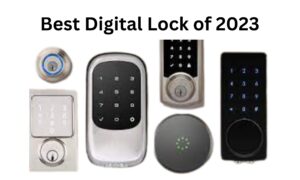Best Digital Lock of 2023
A digital lock is a type of locking mechanism that uses electronic or digital codes to grant access. Unlike traditional locks that use physical keys or combination locks that use a series of dials, digital locks require the user to input a unique code into a keypad or touchscreen. Digital locks are becoming increasingly popular in both residential and commercial settings due to their convenience, security, and flexibility.
There are several types of digital locks, including keypad locks, touchscreen locks, and smart locks. Keypad locks are the most basic type of digital lock and require the user to input a pre-programmed code using a numeric keypad. Touchscreen locks are similar to keypad locks but use a touch screen instead of physical buttons. Smart locks, on the other hand, are more advanced and can be operated using a smartphone app or even voice commands.

Digital Lock
One of the main advantages of digital locks is convenience. With a digital lock, you no longer need to carry around a physical key or worry about losing it. Instead, you can simply input your code or use your smartphone to unlock the door. This can be especially useful for people who frequently lose their keys or have multiple people who need access to the same space.
Digital locks are also more secure than traditional locks. Unlike physical keys, which can be lost, stolen, or duplicated, digital codes are much more difficult to crack. Additionally, many digital locks have features such as automatic locking and timed access that can further enhance security.
Another advantage of digital locks is flexibility. With a digital lock, you can easily change the access code whenever you want. This can be especially useful in commercial settings where employees come and go frequently or in rental properties where tenants change frequently. Some smart locks even allow you to grant temporary access to visitors or service providers, such as cleaners or maintenance workers.
While digital locks are generally considered to be very secure, there are some potential drawbacks to consider. For example, if the battery dies, you may be locked out of your home or office until you can replace it. Additionally, digital locks can be more expensive than traditional locks, especially if you opt for a smart lock with advanced features.
Features of Digital Lock
A digital lock is a lock that is operated using electronic or digital signals rather than mechanical components such as keys. Some of the features of digital locks include:
- Keypad: Most digital locks feature a keypad that allows users to input a unique code to unlock the lock. The keypad may be backlit for use in low-light conditions.
- Touchscreen: Some digital locks feature a touchscreen interface, which may offer a larger display and more user-friendly interface than a traditional keypad.
- Biometric recognition: Some advanced digital locks feature biometric recognition technology, such as fingerprint or facial recognition, which allows users to unlock the lock using their unique biometric data.
- Bluetooth connectivity: Some digital locks can be connected to a smartphone or other Bluetooth-enabled device, allowing users to unlock the lock remotely using a mobile app.
- Keyless: Digital locks do not require traditional keys to operate, reducing the risk of lost or stolen keys.
- Multiple access codes: Many digital locks allow multiple users to have their own unique access codes, making it easy to grant or revoke access to specific individuals.
- Audit trail: Some digital locks offer an audit trail feature that tracks who has entered or attempted to enter a space, providing an added layer of security.
- Battery-powered: Digital locks are typically powered by batteries, which may need to be replaced periodically. Some digital locks offer low-battery alerts to ensure that users are aware when the battery needs to be changed.
Overall, digital locks offer a range of features and benefits that can enhance security and convenience for home or business owners.
Benefits of Digital Lock
Digital locks have become increasingly popular in recent years due to the numerous benefits they offer. Here are some of the advantages of using digital locks:
- Convenience: One of the most significant benefits of digital locks is their convenience. Unlike traditional locks that require a physical key, digital locks can be unlocked using a password, a fingerprint, or a smartphone app, making it easier to access your home or office.
- Security: Digital locks offer a higher level of security compared to traditional locks. With features such as biometric scanning and advanced encryption, digital locks make it difficult for unauthorized individuals to gain access to your property.
- Keyless entry: With digital locks, you no longer have to worry about lost or stolen keys. Instead, you can use your smartphone or a password to unlock your door.
- Remote access: Many digital locks come with a smartphone app that allows you to lock and unlock your door remotely. This feature is especially useful when you need to grant access to someone when you’re not at home or in the office.
- Audit trail: Some digital locks have an audit trail feature that records every time the lock is accessed. This feature is useful for monitoring who is entering and leaving your property.
- Integration with other smart devices: Many digital locks can be integrated with other smart devices in your home, such as smart speakers and security systems, to provide an even more comprehensive security system.
Overall, digital locks offer a convenient, secure, and versatile solution for securing your home or office.
Digital Lock Installation Process
The installation process for a digital lock may vary slightly depending on the specific type and model of lock you are installing. However, here are some general steps that can help guide you through the process:
- Choose a location for the lock: Select the area where you want to install the digital lock. This can be on your front door, back door, bedroom door or any other location you want to secure.
- Remove the existing lock: If there is a traditional lock already installed, remove it by unscrewing the screws from the inside.
- Install the digital lock: Follow the manufacturer’s instructions for installation. This may involve inserting batteries, mounting the lock onto the door, and connecting any wires.
- Test the lock: After installing the lock, test it to make sure it is working correctly. Try using the code or key fob provided to unlock and lock the door.
- Set up access codes: If the digital lock allows for access codes, set them up according to the instructions provided. Be sure to choose codes that are easy for you to remember but difficult for others to guess.
- Secure the lock: Once the lock is installed and tested, secure it with screws to ensure it remains firmly attached to the door.
- Program the lock: Program any additional features such as auto-lock or time-sensitive access codes according to the manufacturer’s instructions.
Remember to keep the user manual and any additional information provided by the manufacturer handy in case you need to refer to it during the installation process or for future maintenance.
Things to know about Digital Lock
- Types of Digital Locks: There are several types of digital locks, including keypad locks, card swipe locks, fingerprint locks, and Bluetooth-enabled locks. Each type has its unique features, advantages, and limitations.
- Security: Digital locks offer increased security over traditional locks since they are harder to pick or tamper with. However, it’s essential to choose a high-quality digital lock from a reputable brand to ensure its security features.
- Power Source: Digital locks rely on power to function. Some models require batteries, while others can be connected to the main electrical system of the building. Ensure you have a backup power source in case the battery dies, or there is a power outage.
- Compatibility: Before purchasing a digital lock, ensure it is compatible with your door type and size. Most digital locks are designed to fit standard doors, but you should double-check before purchasing.
- Installation: Digital locks are relatively easy to install and do not require professional assistance. However, if you are not familiar with basic DIY tasks, it’s advisable to seek professional help.
- Cost: Digital locks are generally more expensive than traditional locks. The price can vary depending on the type, features, and brand.
- Maintenance: Digital locks require minimal maintenance compared to traditional locks. However, it’s essential to keep the lock clean and ensure the battery or power source is functioning correctly.
- Access control: Digital locks offer more control over who has access to a particular room or building. Some models allow you to set up different access codes for different people and track who has entered the building and when.
- Convenience: Digital locks offer a higher level of convenience since you can easily change access codes or lock and unlock doors remotely using a smartphone app.
- Warranty: Most digital locks come with a warranty that covers any defects or malfunction for a certain period. Be sure to read the warranty terms carefully before purchasing.
Frequently asked questions about Digital Lock
Q: What is a digital lock?
A: A digital lock is a locking device that uses electronic or digital technology to operate. It typically requires a code or other electronic credential to unlock, rather than a physical key.
Q: How does a digital lock work?
A: Digital locks can work in different ways depending on the type of lock, but they generally use electronic or digital components to allow access. This may involve entering a code on a keypad, scanning a fingerprint, or using a smartphone app to unlock the lock.
Q: What are the advantages of using a digital lock?
A: Digital locks offer several advantages over traditional locks, including increased security, convenience, and flexibility. They can also be easier to install and maintain, and may allow for remote access control.
Q: Are digital locks more secure than traditional locks?
A: Digital locks can offer increased security in some cases, as they typically require a specific code or credential to unlock. However, they can also be vulnerable to hacking or other forms of electronic attack, so it’s important to choose a high-quality digital lock and follow best security practices.
Q: What types of digital locks are available?
A: There are many types of digital locks available, including keypad locks, biometric locks (such as fingerprint or facial recognition), smart locks that can be controlled through a smartphone app, and more.
Q: Can a digital lock be hacked?
A: Yes, digital locks can be vulnerable to hacking or other forms of electronic attack. However, high-quality digital locks with strong encryption and other security measures can help to minimize this risk.
Q: How do I choose the right digital lock for my needs?
A: When choosing a digital lock, consider factors such as security features, ease of use, compatibility with your existing systems, and your budget. It can also be helpful to read reviews and consult with a professional locksmith or security expert.
Q: How do I install a digital lock?
A: The process for installing a digital lock can vary depending on the specific lock and your existing hardware. In general, you’ll need to remove your old lock and follow the manufacturer’s instructions for installing and configuring the digital lock. It’s often a good idea to consult with a professional locksmith or installer to ensure proper installation and operation.
Conclusion
In conclusion, digital locks are a convenient, secure, and flexible alternative to traditional locks. With several types of digital locks available, there is a solution to fit almost any residential or commercial need. While there are some potential drawbacks to consider, the benefits of digital locks make them an excellent choice for anyone looking for a modern, reliable locking solution.

Leave a Reply
Want to join the discussion?Feel free to contribute!